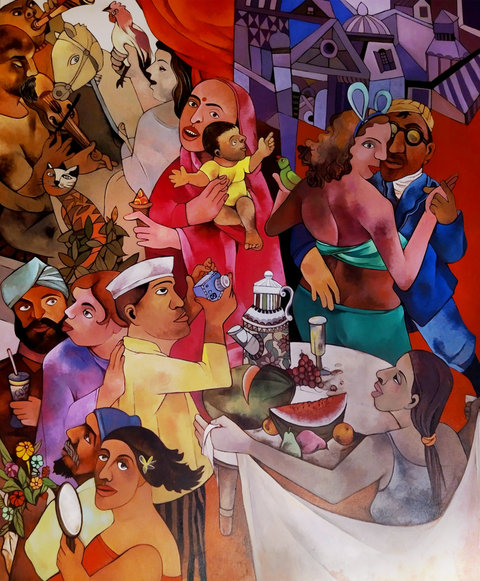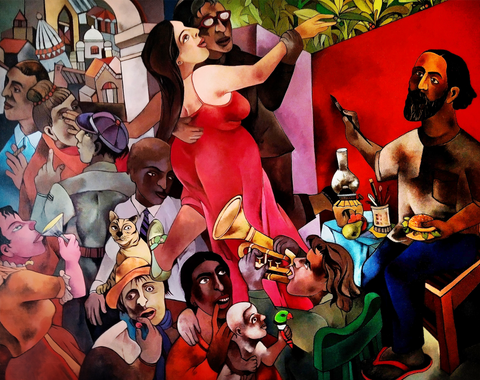Gurcharan Singh
The dark side of life as embodied by prostitutes and pimps slinking through the sleazy alleyways of crowded cities is what moves Gurcharan Singh to take up his paintbrush. Outcasts, the wretchedly poor living on the fringes of society and feeding on it and being fed on it in turn, form the basis of Singh's works. Walking down the less savory areas of cities, Gurcharan transferred his observations onto the canvas bringing to life people who are seldom thought of by their more fortunate brethren.
One of his earliest paintings was titled "The Red Light in Black and White". As the name suggests it was a study in black and white of a woman waiting at a traffic signal for it to change from red, the sign of danger. This work was the result of a visit to the Red Light district that jolted Singh out of a complacency that he believed he was in. All kinds of colors ranging from red to green to shocking pinks were present in abundance but Singh saw nothing but a deep, dark abyss down which men and women were sliding, with reckless abandon. A journey into a colorful hell; one from which he emerged to paint furiously, translating his sorrow and despair into images that haunt the mind.
"Les Miserables" was the outcome of a night's sojourn in a cheap bar room, consuming even cheaper liquor. Sitting there hour after hour, watching the influx of humanity, Singh pondered the lives of whores and pimps. The bestiality, the cruelty, the hand-to-mouth existence all jumbled together into a kaleidoscope of shifting colors and patterns. As the darkness deepened, it seemed to Singh that this sordid world didn't differ a great deal from the world that he knew. If there was more poverty there was also a greater honesty, and at least the hypocrisy that cloaked niggardly actions was mercifully absent.
Back in the studio, Gurcharan would attack the canvas savagely to paint hundreds of characters culled from his night's experiences. The hard-as-nails whore, no longer a victim, the licentious men and a host of others would emerge to create a panorama of people that was colorful, vibrant, lusty with life. Painted in garish reds and blues the faces of the humans, especially those of the women are wonderfully expressive conveying a range of emotions that is deeply moving.
As he grew with experience, Singh's work began to take on a more mature hue. No longer a simple chronicler, he started exploring the relationships between the various elements that make up this world. Most noteworthy is his practice of juxtaposing animals with prostitutes, a recurrent theme that dominates his paintings. Using them as symbols to expose the primitive in humans, Gurcharan Singh set out to explore the links between animal and human nature. Primarily, though, his subjects always remained the underprivileged and exploited women living on the fringes of society.
Reflective and sad, almost all of his work is casual and unplanned and he explains, "... I don't get too much time to paint and they (his paintings) are also small." He is currently working at animation at the Films Division on a film on Nehru.
His artwork displayed with us are two acrylic on papers titled Saturday Blast and Saturday Night both made in 2021.






